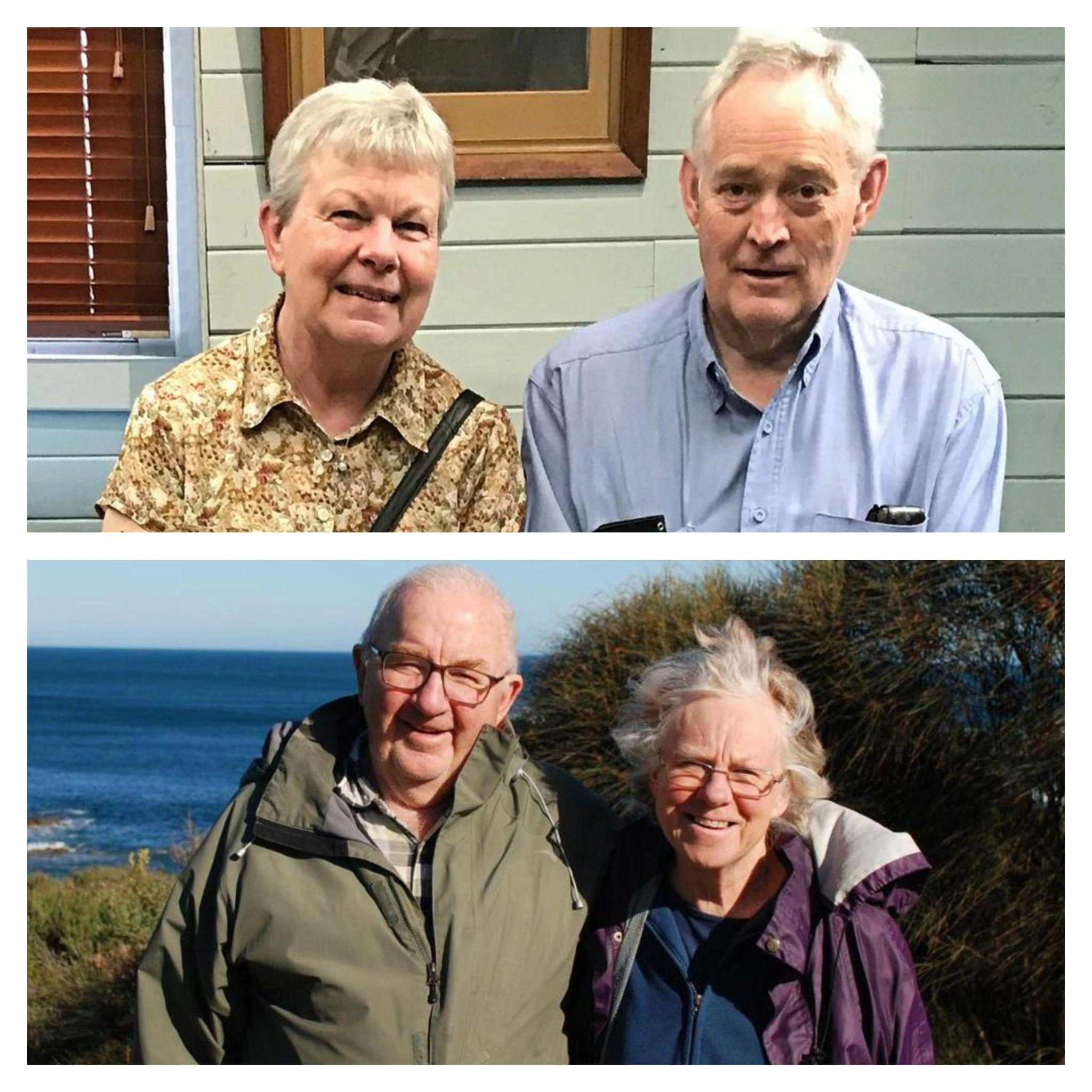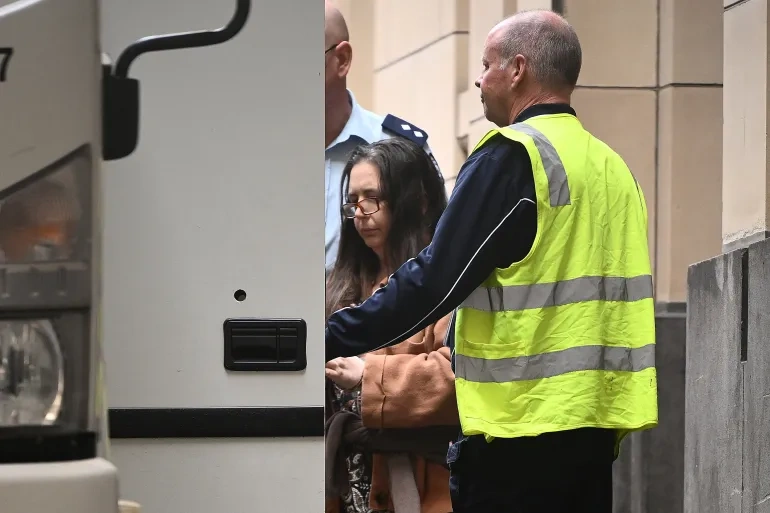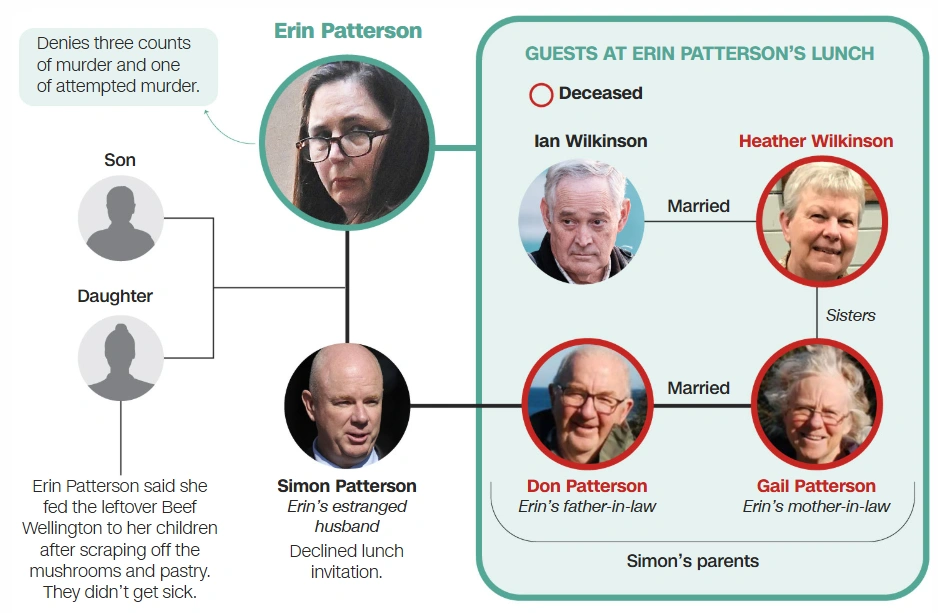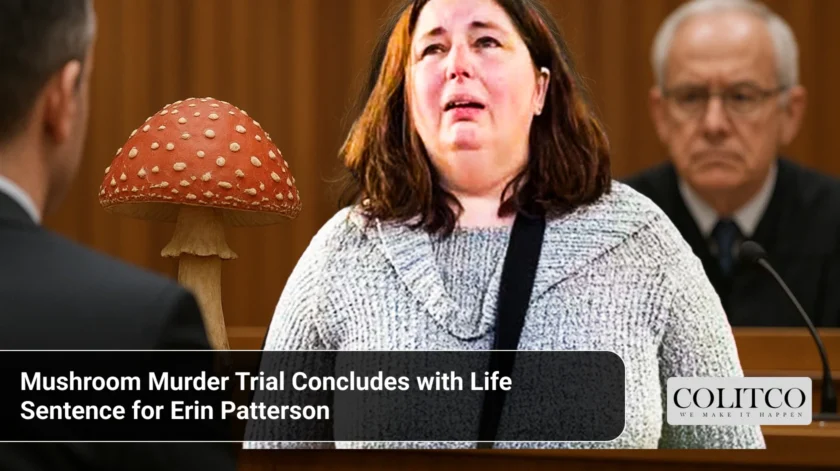Australian woman Erin Patterson received a life sentence with 33 years non-parole for poisoning three relatives with death cap mushrooms. Justice Christopher Beale delivered the sentence at Victoria’s Supreme Court on September 8, 2025.
Triple Murder Conviction Shocks Nation
Patterson murdered her estranged husband’s parents Don and Gail Patterson along with Gail’s sister Heather Wilkinson in July 2023. The 50-year-old served individual beef Wellington pastries laced with toxic death cap mushrooms at her Leongatha home.
Ian Wilkinson, Heather’s husband, survived the poisoning but required seven weeks of hospitalisation. Patterson also faced conviction for attempting to murder Wilkinson.

The victims of toxic mushrooms
Court Delivers Maximum Sentence
Justice Beale described Patterson’s actions as falling into the “most serious category” of murder and attempted murder. The judge noted Patterson showed no remorse throughout the trial proceedings.
“You deprived your children of their grandparents,” Beale told Patterson during sentencing. The judge emphasised Patterson’s actions involved “significant premeditation” followed by an “elaborate cover-up”.
Patterson will serve three consecutive life sentences for murder plus 25 years for attempted murder. All sentences run concurrently with eligibility for parole in 2056 when Patterson turns 83.

Erin Patterson
Evidence Reveals Calculated Planning
Prosecutors demonstrated Patterson researched death cap mushroom locations using the citizen science website iNaturalist. Phone data showed Patterson visited mushroom foraging sites in April and May 2023.
Patterson purchased a food dehydrator on April 28, 2023, the same day her phone pinged near known death cap locations. She disposed of the dehydrator at Koonwarra Transfer Station while victims remained hospitalised.
Forensic examination revealed Patterson’s fingerprints and traces of Amanita phalloides toxins on the recovered dehydrator. Police found the same toxins in urine samples from male guests.
Victims Die Within Days of Poisoning
Don and Gail Patterson died on August 5, 2023, from multi-organ failure. Heather Wilkinson succumbed to her injuries on August 4, 2023. Don Patterson died despite receiving a liver transplant.
All four guests required hospitalisation within 24 hours of consuming the meal. Medical staff diagnosed severe liver failure caused by death cap mushroom poisoning.
Death cap mushrooms contain potent amanita toxins that prevent protein production in liver cells. The toxins cause cell death leading to liver failure approximately two days after ingestion.

Family Tree of the victims involved
Defence Claims Accidental Poisoning
Patterson’s defence team argued the deaths resulted from a terrible accident. Defence counsel Colin Mandy claimed Patterson accidentally mixed foraged mushrooms with store-bought varieties.
Patterson testified for eight days during the 10-week trial. She maintained the mushroom inclusion was unintentional throughout the proceedings.
The defence suggested Patterson experienced less severe symptoms because she vomited after eating cake following the main course. Patterson claimed an eating disorder caused her post-meal vomiting.
Prosecution Builds Case on Deception
Prosecutor Nanette Rogers outlined four key deceptions in Patterson’s conduct. Rogers argued Patterson fabricated a cancer diagnosis to justify the lunch invitation.
Patterson claimed she suffered diarrhoea following the meal to appear similarly affected. She persistently lied about mushroom sources and attempted to dispose of evidence.
Rogers noted Patterson lived a “double life” showing public friendship toward victims while privately expressing frustration. Facebook messages revealed Patterson’s anger toward her in-laws in December 2022.
Trial Captivates Australian Public
The Supreme Court trial commenced on April 29, 2025, in Morwell. Media representatives flocked to the courthouse as the case drew global attention.
The trial inspired four separate podcasts analysing daily proceedings. International news outlets covered the case extensively throughout the trial period.
Victoria’s Supreme Court broadcast the sentencing hearing live for the first time. The case became one of Australia’s most high-profile criminal trials.
Jury Deliberates Six Days
Twelve jurors deliberated for six days following closing arguments. The jury remained sequestered due to intense media scrutiny surrounding the case.
On July 7, 2025, jurors returned unanimous guilty verdicts on all charges. The verdicts indicated jurors rejected Patterson’s accident defence.
Australian law requires unanimous jury decisions for criminal convictions. Jurors remain anonymous and cannot discuss deliberations publicly.
Victims’ Families Seek Privacy
Victoria Police requested privacy for victims’ families following the conviction. Ian Wilkinson provided victim impact statements during pre-sentence hearings.
“I am distressed that Erin has acted with callous and calculated disregard for my life,” Wilkinson told the court. He forgave Patterson for attempting to murder him but not for killing family members.
Patterson’s estranged husband Simon did not attend sentencing proceedings. Family members read his statement expressing children’s loss of grandparent relationships.
Also Read: Erin Patterson and the Deadly Lunch: Inside Australia’s Mushroom Murder Trial
Appeal Options Remain Open
Patterson has 28 days from sentencing to appeal her convictions and sentence. Legal experts suggest appeals could challenge conviction or sentence length.
Patterson currently serves her sentence at Dame Phyllis Frost Centre in western Melbourne. Corrections officials hold her in isolation for safety reasons.
The case marks one of the longest sentences ever imposed on an Australian woman. Patterson faces harsh custody conditions due to her notorious status.
Case Inspires Documentary Coverage
Stan released a three-part documentary titled “Death Cap Murders” following sentencing. The series portrays Patterson as a woman craving community acceptance.
Justice Beale acknowledged media attention would likely keep Patterson in solitary confinement. Multiple books and television series about the case are reportedly in development.
The Leongatha mushroom murders represent Australia’s first recorded case of intentional death cap mushroom poisoning. Patterson’s conviction establishes legal precedent for future toxic mushroom cases.












